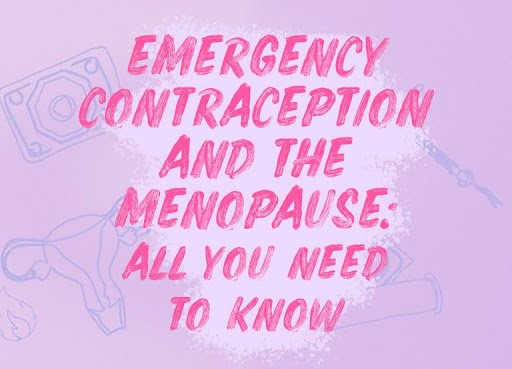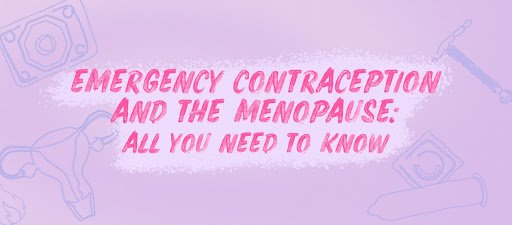Emergency contraception and the menopause: All you need to know
It’s something almost half of the world’s population goes through, and yet as a society the menopause is still seen as something of a taboo that we don’t really talk about.
This is partly why you may be unsure about whether you can still get pregnant while experiencing menopausal symptoms, and whether to take emergency contraception if you have unprotected sex and want to avoid pregnancy.
What is menopause and perimenopause?
“Menopause is technically one day” says Sue May*, menopause coach and founder of Midlife Evolved.” The day you have not had a period for 12 months, that day you are in menopause.”
The term Menopause refers to when your periods stop due to lower hormone levels. Women and people with uteruses typically experience menopause between the ages of 45 and 55, but it can happen earlier. Menopause is usually diagnosed after 12 months without periods for women over 50, or after 24 months without periods for women under 50.
Perimenopause is when you have symptoms of menopause but you are still getting your period, and during this time you may still be able to get pregnant even if your periods are irregular or you haven’t had one in a while. “The term ‘Perimenopause’ refers to the years surrounding the time when you transition to menopause,” says Sue May. “It can start as early as your mid to late thirties and last anywhere from four to twelve years.”
What are the signs of perimenopause?
Different people experience perimenopause and menopause differently. Some people may get a variety of symptoms, and others may not.
“During perimenopause, your oestrogen levels can fluctuate erratically, leaving you with many symptoms,” says Sue May. “The first thing you may notice is if you once had regular menstrual cycles, they will start to get more irregular. Either a longer or shorter time between cycles (either can happen during perimenopause).”
The first signs of perimenopause can be (but are not always) irregular periods, so you may get your period less often and more randomly. Other signs include:
-
- Changes to your mood, such as mood swings or low mood
- Brain fog
- Hot flashes
- Night sweats
- Difficulty sleeping
- Heart palpitations
- Headaches and migraines
- Muscle ache and joint pain
- Weight gain
- Dry or itchy skin
- Vaginal dryness
- Reduced sex drive
- Urinary tract infections (UTIS)
These symptoms can last for a few months to a few years, and they may change over time.
Contraception before the menopause
You have ‘reached menopause’ when you have not had a period for at least 12 months. Before reaching menopause, you may still have the ability to get pregnant. If this is something you want to avoid, you should still use a method of contraception until it is confirmed that you have reached menopause.
There are a variety of contraception options which may be suitable for women and people with uteruses who are approaching or are in perimenopause. These include:
-
- Barrier methods: These include condoms, diaphragms, and caps. They prevent sperm from reaching the egg, and also protect against sexually transmitted infections (STIs). They have no hormonal side effects, but they require correct and consistent use.
- Contraceptive pills: There are two main types of contraceptive pills: those which include oestrogen and progestogen (known as combined pills) and progestogen only pills (also known as mini pills). Some progestogen only pills like Hana® are available to buy over the pharmacy counter or online without the need for a doctor’s appointment. Progestogen-only pills are suitable for people over 35 who smoke and can be used by people who cannot and do not want to take oestrogen. Speak to your doctor or pharmacist to see which contraceptive pill might be right for you.
- Intrauterine devices: These are small devices that are inserted into the womb by a doctor or nurse. There are two types: the copper IUD, which releases copper to kill sperm and prevent implantation; and the hormonal IUS (Mirena), which releases progestogen to thicken the cervical mucus and thin the womb lining.
- Sterilisation: This is a permanent method of contraception that involves blocking or cutting the tubes that carry eggs from the ovaries to the womb (tubal ligation) or sperm from the testicles to the penis (vasectomy). It is very effective, but it requires surgery and it cannot be reversed.
Each method has its benefits and risks, and some may affect your menopausal symptoms or bone health. You should discuss your options with your healthcare provider to find the best method for you.
Contraception during menopause
“If you are in perimenopause and don’t want to get pregnant then you will still need to use contraception,”says Sue May. “If you are in menopause and have not had a cycle in 12 months, then you are probably no longer fertile and usually don’t have to worry about pregnancy.”
Some hormonal contraception can affect your periods and so it may be harder to tell when you have reached menopause.
There are two options for confirming menopause while using hormonal contraception:
-
- Stopping hormonal contraception and waiting for your periods to stop. This may take several months or years, depending on your age and method of contraception. If you want to avoid pregnancy, you should use another method of contraception during this time, such as condoms or a copper IUD.
- Having a blood test to measure your follicle-stimulating hormone (FSH) levels. This can indicate if you are in menopause or not, but it is usually not very accurate if you are using hormonal contraception. You should stop your hormonal contraception for at least four weeks before having the test, and use another method of contraception during this time. Speak to your doctor for more information and advice if this is something you’re interested in.
Contraception after menopause
Once menopause has been confirmed by a doctor, you will no longer be ovulating and so will not need to take contraception to prevent pregnancy.
Some women and people with uteruses may choose to use hormone replacement therapy (HRT) to help with their symptoms. HRT is not a contraceptive, and it contains very low levels of hormones that do not prevent ovulation.Therefore, you should not rely on HRT to prevent pregnancy before or during perimenopause.
Emergency contraception and HRT
If you have unprotected sex or experience contraceptive failure before or during perimenopause, you may want to take emergency contraception to reduce the risk of unplanned pregnancy.
There are two types of emergency contraception available:
-
- Morning after pills: This is a tablet that contains either ulipristal acetate, the active ingredient in ellaOne, and levonorgestrel. Morning after pills help prevent pregnancy by delaying or preventing ovulation. They should be taken as soon as possible after unprotected sex, ideally within 24 hours. Ulipristal acetate can prevent pregnancy up to 120 hours (5 days) after unprotected sex, but it is most effective when taken ASAP. Morning after pills containing levonorgestrel can be taken up to 72 hours (3 days) after unprotected sex.
- The IUD: This is a copper IUD that is inserted into the womb by a doctor or nurse. It is used as a regular contraceptive, but it can also be an emergency contraceptive if it is inserted within 5 days of unprotected sex.
If you are using HRT, you should be aware of some possible interactions with emergency contraception.
-
- It is not advisable to take morning after pills containing ulipristal acetate if you are using HRT, as it may reduce its effectiveness and increase the risk of bleeding. Speak to your doctor about your emergency contraceptive options if you are taking HRT.
- If you have taken morning after pills containing ulipristal acetate, you should wait for at least five days before restarting your HRT.
- If you have taken levonorgestrel, you can restart your HRT immediately.
- If you have had an emergency IUD fitted, you can continue your HRT as normal.
Whatever your age or life circumstances, if you have unprotected sex, think there’s a chance you could get pregnant and decide that’s something you want to avoid then you may wish to use emergency contraception to help prevent unplanned pregnancy. If you’ve taken the morning after pill in your life, why not share your experience by clicking the button below to help show others that they are not alone?
*Sue May does not endorse any products or brands.
ellaOne® 30mg film-coated tablet contains ulipristal acetate and is indicated for emergency contraception within 120 hours (5 days) of unprotected sexual intercourse or contraceptive failure.
Hana® 75µg film-coated tablets contains desogestrel and is an oral contraception for women of child bearing age to prevent pregnancy. Always read the instructions on the package leaflet carefully.




